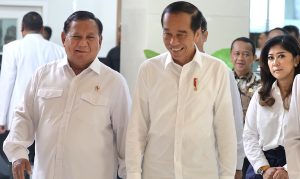Indonesia’s election commission has confirmed Defense Minister Prabowo Subianto as the nation’s next president, affirming the unofficial counts that showed the defense minister scoring a landslide victory over his two rivals
The former special forces commander won the February 14 contest with more than 58 percent of the nationwide vote and is also believed to have won 36 of Indonesia’s 38 provinces. His two rivals, former Jakarta Governor Anies Baswedan and Ganjar Pranowo, the ex-governor of Central Java, received about 25 percent and 17 percent, respectively, according to the official results.
The official results from the General Elections Commission of Indonesia closely mirror the unofficial counts that emerged on the night of February 14, which are set to be formally challenged by both the Anies and Ganjar campaigns.
Speaking to supporters and campaign volunteers yesterday at his residence in south Jakarta, the 72-year-old former general pledged to govern for all Indonesians. “We invite all Indonesians to look ahead in unity because our challenges are still huge,” he said, according to a Reuters report.
He also repeated his earlier pledge that he would continue the economic policies of President Joko “Jokowi” Widodo, who during his decade in power has focused on overhauling Indonesia’s infrastructure and promoting foreign investment. “We will use the strong foundation he has built, especially in the economic sector, to work faster, harder, to bring results as quickly as possible to the Indonesian people,” Prabowo said.
However, the months between now and Prabowo’s inauguration in October is likely to be filled with challenges. Anies and Ganjar have both announced their intention to contest the result in the Constitutional Court, which usually handles election disputes in Indonesia. Both have also raised the possibility of initiating an investigation in the Parliament, which has the power to investigate government policies and the conduct of public officials.
The rival campaigns have three days to lodge complaints with the Constitutional Court, Reuters reported.
The ruling Indonesian Democratic Party of Struggle, which ran Ganjar as its candidate, alleges that the election was marred “by abuse of power, ranging from legal aspects to the use of state facilities.” Anies yesterday confirmed his intention to contest the election result, adding that “a leadership born out of a sullied process, with deviations, fraud, will produce a regime with unjust policies.”
While neither campaign has presented hard evidence for its claims, the run-up to the election saw Jokowi himself being accused of election interference. Much of this surrounded the Constitutional Court ruling that allowed Jokowi’s 36-year-old son Gibran Rakabuming Raka to run as Prabowo’s vice-presidential running-mate. The Court, which the president’s brother-in-law then headed, created an exception to the minimum age limit of 40 for candidates who had held elected positions at lower levels of government. Many interpreted Gibran’s appointment as Jokowi’s de facto endorsement of Prabowo, whom he defeated at both the 2014 and 2019 elections, in a bid to ensure that his own influence continues after he departs office.
For this and other reasons, election monitors have also raised concerns about the conduct of the polls. The Asian Network for Free Elections has noted “concerns regarding the quality of various aspects of the overall electoral processes,” including the independence of the election commission and the “mobilization and misuse of state resources to sway voter preferences.” Indonesia Corruption Watch and KontraS, a human rights group, declared the election the least free and fair of the post-Suharto era.
Whether these irregularities were significant enough to account for the massive margin of Prabowo’s victory remains to be seen – but it will be a question that seems set to be litigated in both court and Parliament between now and October.

































